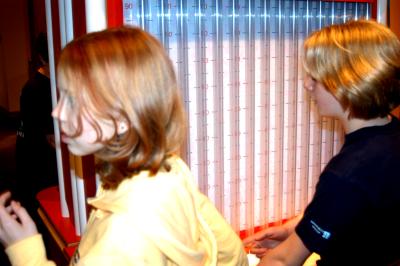 December
21st, 2006
December
21st, 2006
Don't tell me how to parent. That's it. That's all I have to say. Simple
enough. It's not your goddamn business so please, unless I've opened
the door, asked for your input, or you have some stake in my daughter's
upbringing please, please, please, don't cross that line and project
your own opinion on me.
I would appreciate it.
This is a pet peeve of mine, admittedly, people who can't keep their
viewpoints on parenting to themselves. It's one thing if someone wants
to share their views on politics or religion as these are areas of debate
and personal conviction but to butt into another person's personal relationship
with their child?
How rude!
I realize people have strong points of view but it's not like it's
socially acceptable to walk up to a married couple and say, "Hey,
I don't agree with the way you two are communicating, I think you should
have more heart to hearts and in fact should schedule those every afternoon
before dinner." Most people would find that invasive and at some
point you're going to get the finger for butting in where you don't
bloody well belong.
Yet for some reason a substantial percentage of the populace does not
understand nor respect this simple and reasonable boundary when it comes
to parenting. True, it takes a village to raise a child but if you don't
have legal guardianship or have been given responsibility for a child
by a legal guardian or have been asked for an opinion then keep your
damn mouth shut (it's called manners).
Parents don't appreciate unsolicited advice and believe it or not they
get A LOT of it. Personally, I believe most parents shrug it off as
another spouting off at the mouth by others who are generalizing and
acting like experts where the underlying indication is that the know-it-all
knows better than the parent who's been raising a child for one, two,
five, or fifteen years.
What's the point of all that anyway? Do people who do this somehow
think they're being helpful to me, someone with years of child psychology
under my belt (not to mention one year of being a nanny and six years
of being a parent)? Do they think just because they watch Dr. Phil every
other day that they somehow understand the stages of development, interpersonal
communication, or the like? What the hell?!
And believe it or not there are different breeds of the seemingly ubiquitous
"parenting expert". There's the non-parent know-it-all who
doesn't seem to get that listening to them is like going to the dentist
for advice about a rattling catalytic converter; parenting is a little
more than abstract and conceptualized theory! There's the relative or
parent who, having their children out of the house now thinks it's their
job to unofficially adopt yours (and give you minute by minute instructions
on how it "should" be done--I mean they're older so they must
know better, right?). And then there's the loving parent who thinks
their theories on parenting are golden because hell, they're a parent
and have been for awhile, yet their child is constantly lying, throwing
tantrums, and manipulating adults without consequence. Yeah, I'm really
going to listen to them, they're obviously super successful at helping
their child become a well adjusted human being. And then there are those
people that, though their children are fairly well adjusted, believe
that this is somehow a basis for forcing their religious and/or political
views on you because, hey, they're from X religious and Y political
party and their kids aren't acting out in the way yours did last week
so it must be because your family doesn't do X and Y (forget the fact
that their kid is acting out in other ways that your child isn't!!!).
And worst of all is the person who in a conversation that starts "Looks
like it might rain today" learns you have children and suddenly
has all the answers to your particular situation that they know absolutely
nothing about. How arrogant is that?
So I'm not going to apologize and here's what I'm not going to apologize
for:
I'm not going to apologize to you for our first phone conversation
where you as a non-parent rambled poetic for twenty minutes about what
I "should" be parenting like and what I was doing "wrong"--without
any indication that your criticism was welcome nor even relevant to
my family situation. I'm not going to apologize to you for politely
commenting on your child throwing a tantrum while we were at a restaurant
when I'd spent the previous five or six months allowing you to parent
in your own way (your business, not mine) and yet you'd spent that entire
time criticizing how I choose to parent (my business, not yours)--and
for the record it is my business when I go in public with a child (or
adult) and they make a scene. I'm not going to apologize to someone
who yells at one child for breathing and lets the other get away with
murder and then tells me I'm "too strict" and I should force
gender stereotypes on my daughter--a sphincter says what? And I'm not
going to apologize to those who think they know better because they
have a certain belief system--belief systems don't raise well balanced
children!
Well balanced and loving parents do.
You see, I don't parent based on how I feel. I don't parent based on
a psychological framework, a social one, a spiritual one, or a political
one. I have this silly little idea called results based parenting and
the funny thing it's pretty simple. You might call it trial and error.
I try something. I observe. Does it work? Yes? No? I learn, I continue
forward. Reality in the present (and memory of the past) is my compass
to parenting. Does Jung's theory on children help with my daughter?
Yes? Okay, I'll work with that. Does my daughter respond to an authoritarian
hand or a soft one? Ok, I'll work with whatever has the positive result
I'm looking for. This is in large part how I parent.
Take for instance a little discussion Vipassana and I recently had
regarding our daughter. Now in the past when she hasn't had school on
a weekday I've either had to work from home or bring my little girl
into the office (an experience she's learned to expect and tolerate).
Now that she's old enough we've started to discuss letting her stay
at home alone. One of the issues with this is being able to trust that
she'll act responsibility without adult supervision; in our case that
means complete her chores before playing and listening to music. Vipassana
wanted to write lists for her and if she completed those every day,
we could trust her to be home alone. I wanted to leave her home without
lists as I felt if she was responsible enough to stay home she was responsible
enough to be able to know our expectations (of which we continually
remind her).
So yesterday I gave the little one a hug then locked the door behind
me as I left her home alone for the day. Vipassana and I somehow managed
to agree we'd try the "no list" option and see how the girl
did. At lunch I stopped by the house to check on her and she proudly
showed me not only the chores she'd done, but some extras she did (such
as organize the DVD library in the living room). When I got home in
the evening all her chores were done and she'd even taken the initiative
to practice her saxophone without any instruction.
This is results based parenting. We tried something. It worked. So
we'll stick with it. If it didn't work we might try the list (yes, I
am willing to try things I don't necessarily agree with) or we might
come up with someone else. We try, we watch, and we grow from there.

This month I've been expressing my views on parenting but in my defense
I'm not throwing it in your or anyone else's face. You're making a conscious
decision to come here and consume my opinions, my experiences, my views.
I'm not saying I'm right, I'm not saying this is how you should do things,
I'm just saying here's what I think, here are some experiences I've
had, do with them what you will. And for today's rant I'm expressing
another view, that I don't appreciate, nor have any respect for unsolicited
advice, especially from people with questionable track records in parenting.
This does not make me a hypocrite--I am not expressing these opinions
to you without your consent--and frankly, parent how you feel best,
that's your job (not mine!). This is simply my rant, my response, my
15 minutes of fame throwing shit back in the faces of all the know-it-alls
that think-they-know-better: having an opinion on parenting doesn't
mean others want to hear it and having the ability to copulate and procreate
doesn't exactly make you an expert in the field.

December 31st, 2006
![]()
![]()
![]()

 December
25th, 2006
December
25th, 2006 December
24th, 2006
December
24th, 2006 December
22nd, 2006
December
22nd, 2006 December
21st, 2006
December
21st, 2006 December
19th, 2006
December
19th, 2006 December
12th, 2006
December
12th, 2006 December
11th, 2006
December
11th, 2006 December
10th, 2006
December
10th, 2006 December
7th, 2006
December
7th, 2006